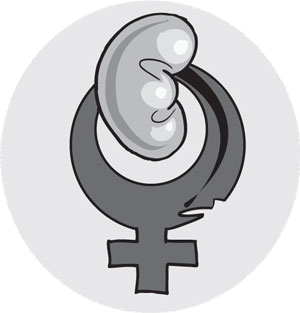Reply To:
Name - Reply Comment
March 8 was not only World Women’s Day, it was also World Kidney Day and with Sri Lanka still facing a virtual kidney disease epidemic in the North Central province and other areas, the day had special significance for our country.
According to the International Society of Nephrology (ISN), chronic kidney disease (CKD) is a worldwide public health crisis with adverse outcomes of kidney failure and premature death. CKD affects about 195 million women worldwide and it is currently the 8th leading cause of death in women, with close to 600,000 deaths each year.

The risk of developing CKD is at least as high in women as in men, and may even be higher. According to some studies, CKD is more likely to develop in women compared with men, with an average 14% prevalence in women and 12% in men. However, the number of women on dialysis is lower than the number of men. At least three major reasons are recognized so far: CKD progression is slower in women compared to men, psycho-socioeconomic barriers such as lower disease awareness lead to late or no start of dialysis among women and uneven access to care is a major issue in countries with no universal access to healthcare. Kidney transplantation is also unequally spread, mostly due to social, cultural and psychological aspects. Even in some countries that provide kidney transplantation and equitable treatment for men and women, women tend more often to donate kidneys and are less likely to receive them. There is indeed a clear need to address issues of equitable healthcare access for women in areas where it is currently lacking and increase awareness or education to facilitate women’s access to treatment and better health outcomes, ISN says.
Some kidney diseases such as lupus nephropathy or kidney infection (acute or chronic pyelonephritis) typically affect women. Lupus nephritis is a kidney disease caused by an autoimmune disease, which is a disorder in which the body’s immune system attacks the own cells and organs. Pyelonephritis is a potentially severe infection that involves one or both kidneys. Kidney infections (as most urinary tract infections) are more common in women and the risk increases in pregnancy. To ensure good results, as most renal diseases, diagnosis and treatment should be timely, ISN adds.
In Sri Lanka, during the last decade CKD has reached epidemic proportions in the North Central and other provinces. Most researchers attribute the epidemic to groundwater pollution, caused by the excessive use of imported chemical fertilizer, some of which are known to be toxic. In 2015, the national unity government took two major steps to address the crisis. One was the promotion of organic fertiliser on a large scale and the other was the ban on the weedicide Glyphosate which is used mainly in tea plantations. But both measures have run into problems with farmers demanding the renewal of the issue of imported chemical fertilizers which give a bigger harvest though in the long term they pollute groundwater and affect farmer families.
After the February 10 local elections and the major loss suffered by the Central Government parties, a decision was taken to renew the issue of chemical fertiliser and give it free of charge, apparently to win back the support of the farmers. Party politics will be party politics for better or for worse.
However, going beyond party politics, a long – term solution was launched by President Maithripala Sirisena when he started a mission to restore wewas which are widely acclaimed as marvels of ancient engineering. Under the Moragahakanda - Kalu Ganga development project, water will be supplied to more than 2,000 tanks in the North Central, North Western and Eastern provinces. Accordingly, 303 tanks in the North Western Province and 1,600 tanks in the North Central Province will be supplied with water. Another 48 new tanks will be constructed in new colonies of Laggala new town and Medirigiriya.
The main purpose of these wewas is to collect excess rainwater during the rainy season so that it could be used in times of drought. This was the wisdom of our great king Parakramabahu who urged that rainwater should not be allowed to go waste without being used for drinking or cultivation purposes. These are missions where all parties, races and religions could co-operate instead of indulging in extremism which led to the violence in the Kandy administrative district this week.